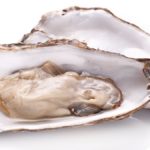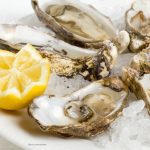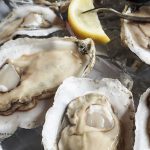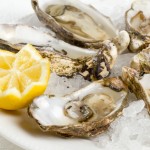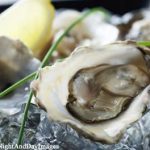Future Seafoods Inc. is recalling Malpeque Oysters in Canada because they may be contaminated with Salmonella bacteria. Oyster are particular concern for bacterial contamination because so many people eat them raw. However, no illnesses have been reported to date in association with the consumption of this product. The recalled product is Future Seafoods Inc. Malpeque Oysters - Common Name Oysters - Std. They are sold in 25 count packages. There is no UPC number. The code on the product is Harvest/process date: 09/10/18 and Harvest location: PE9B. The oysters were sold in Quebec and may have been sold nationally in other provinces in Canada. If you have purchased these oysters, don't eat them, even if you plan to cook them. Some bacteria can produce toxins as they grow that … [Read more...]
Outbreak at Fager’s Island Shell Shocked Oyster Festival in Maryland
According to news reports, officials at the Maryland Department of Public Health are investigating a "stomach flu" outbreak among people who attended the "Shell Shocked" beer and oyster festival on November 4, 2017. That event was held at Fager's Island Restaurant in Ocean City, Maryland. The state health department is working with the Worcester County Health Department on this outbreak. There is no information posted about these illnesses on either government website. According to the Baltimore Sun, the restaurant was allowed to hold a similar event on November 11, 2017. At least 145 people were sickened in this outbreak. What is commonly known as the "stomach flu" is almost always food poisoning. No one has been sick enough to need hospitalization. No deaths are linked to this … [Read more...]
How to Handle, Cook, and Safely Store Shellfish
The Washington State Department of Heath has posted information about how to safely handle, store, and cook shellfish. There have been Vibrio and norovirus outbreaks linked to eating uncooked shellfish, especially oysters, this year. All fresh shellfish should be stored in an open container in the fridge. Put a damp towel on the container to maintain humidity. Do not store shellfish in water, since they will die and may spoil. Shellfish that open and don't close when they are tapped are dead; do not cook or eat them. If the shells of horse clams, soft-shell clams, geoducks, and razor clams don't completely close, you can store them for three of four days. Shellfish that close their shells completely can be stored up to seven days. That includes oysters, littlenecks, butter clams, … [Read more...]
Oysters and Vibriosis
The Centers for Disease Control and Prevention (CDC) is issuing information about the risk of contracting a Vibrio infection when consuming raw oysters. Summer is prime oyster season. And it's the time of year when most illnesses from raw oysters occur. In fact, a man in Washington state recently contracted a Vibrio infection when he purchased a live fish from a fish tank. One of the most common illnesses linked to raw oysters is vibriosis. This infection is caused by the Vibrio vulnificus or the Vibrio parahaemolyticus bacteria that occur naturally in seawater. Oysters are filter eaters, which means they draw in seawater and filter out the food and bacteria. The bacteria then become concentrated in the oysters flesh. Most Vibrio infections are caused by Vibrio parahaemolyticus. … [Read more...]
Another Food Poisoning Outbreak at Seattle Restaurant
Another food poisoning outbreak associated with the consumption of raw oysters has sickened people in Seattle, Washington. This time it's at the White Swan Public House at 1001 Fairview Avenue North. Six people from two separate parties got sick after eating raw oysters at the restaurant on June 30 and July 3, 2017. No laboratory testing has been done, and symptoms suggest fibrosis, but public health officials cannot rule out norovirus. Officials learned about the outbreak on July 6, 2017. Environmental health inspectors were at the restaurant on the same day. The press release states that, "No factors were identified that contribute to the spread of Vibrio, such as insufficient refrigeration temperatures or evidence of cross-contamination." Just like the outbreak at the … [Read more...]
Standard Northern Nova Oysters Recall in Halifax, NS
The Canadian Food Inspection Agency (CFIA) is currently investigating a company-issued recall by Fisherman’s Market International Inc. of its Standard Northern Nova Oysters, a brand sold for raw consumption. There is a possibility that these products were contaminated with Vibrio parahaemolyticus, a bacterium that can occur at high levels in coastal waters during warm summer months. No illnesses have been reported in association with the consumption of this product. Vibrio parahaemolyticus, typically found in raw or undercooked shellfish, can cause non-bloody diarrhea, vomiting, and abdominal pain in susceptible people. The incubation period for the disease is 2-48 hours; if acquired, the illness can last from 2 to 8 days. Those at increased risk of contracting the illness include … [Read more...]
Oregon Norovirus Outbreak Linked to Yaquina Bay Oysters
An Oregon norovirus outbreak that has sickened 17 people has been linked to oysters from Yaquina Bay, according to the Oregon Health Authority. All of those sickened ate the oysters at Lincoln County restaurants between February 12 and February 14, 2016. One person was hospitalized because they were so seriously ill; all have since recovered. Tests performed on an unopened jug of oysters collected from a restaurant tested positive for the same strain of norovirus found in stool samples from three of those sickened. A recall has been issued by Oregon Oyster Farms Inc. in Newport for raw, ready-to-eat shucked oysters sold in half-gallons, one-pint plastic tubs and 10-ounce plastic jars, with sell-by dates of February 19 through March 8. And for oysters sold in mesh bags containing … [Read more...]
Washington Shellfish Recalled After Norovirus Outbreak
According to the Interstate Shellfish Sanitation Conference (ISSC), Washington state has issued a recall of shellfish after a norovirus-like outbreak occurred after an event. At least six people were sickened in this Oregon outbreak; two cases have been confirmed as Norovirus. The event had 100 attendees; about half ate oysters harvested from Hook Canal 5 and Hammersley Inlet in Mason County. Oysters are not definitively linked to the outbreak, since only 10% of the attendees of the event were interviewed, hand-washing facilities were not adequate so an ill employee could have contaminated foods, and the event was crowded so person-to-person transmission could have occurred. But, the Washington State Department of Health then received two additional cases in other areas; those … [Read more...]
Samish Bay WA Oyster Beds Closed After Vibrio Illness
The Washington State Department of Health has confirmed that oysters from Samish Bay is the source of at least one Vibrio illness, commercial harvesting has been ended until September 30, 2014. Vibrio parahaemolyticus is a bacteria that causes gastrointestinal illness in people. There have been nine reports of Vibrio illness this summer in Washington state. The latest confirmed illness is linked to a commercial, not recreational, harvest. There is no word on which specific commercial grower the contaminated shellfish came from. Low tides, hot weather, and sunshine increase the bacteria's population in the summer. Anyone who harvests oysters in that area should cook them to be safe. Vibrio are killed by cooking temperatures. In fact, the government suggests that all shellfish … [Read more...]
Norovirus Outbreak Linked to Texas Oysters
A norovirus outbreak is linked to oysters from Texas. The FDA is warning consumers not to eat raw or partially cooked oysters harvested from Copano Bay in Aransas County, Texas, that were harvested between December 26, 2013 and January 9, 2014 because they may contain norovirus. The Texas Department of State Health Services closed the Bay to shellfish harvesting on January 9, 2014. Six norovirus illnesses in Louisiana have been linked to oysters harvested from that Bay and shipped by Alby's Seafood of Fulton, Texas. A recall of the oysters harvested on December 26, 2013 has been issued, but other shellfish harvested from Copano Bay before it was closed may still be in the marketplace. All shellfish dealers, restaurants, retail food establishments, and consumers are advised to check … [Read more...]
